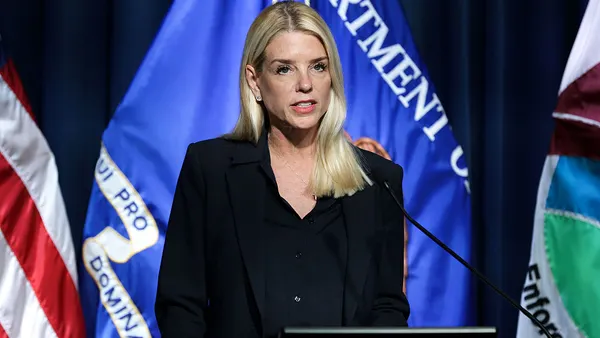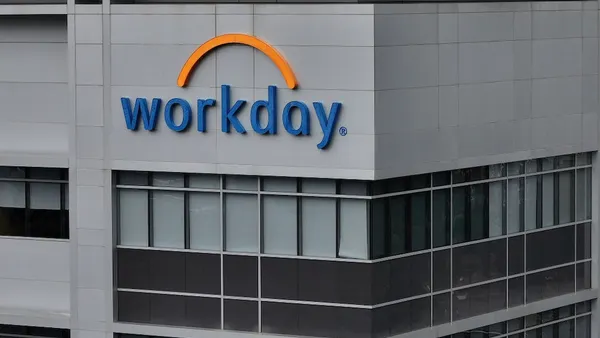Editor's note: Welcome to Resource Actions, our occasional, back-and-forth column covering everything from the bizarre to the day-to-day that, despite everything, impacts HR departments. Please feel free to send all tips, thoughts, weird twitters and alternate accounts to [email protected] and [email protected].
Kathryn Moody: If you aren't on Twitter, you missed some gems this week — but maybe it's better that way.
Many companies have at least an informal, if not a written-in-the-handbook formal, policy on social media use by employees. But as newly inaugurated President Donald Trump has shown, Twitter can be a bit like the wild west. It doesn't take much for a single tweet to affect more than just timelines. Like this:
General Motors is sending Mexican made model of Chevy Cruze to U.S. car dealers-tax free across border. Make in U.S.A.or pay big border tax!
— Donald J. Trump (@realDonaldTrump) January 3, 2017
Two weeks later...
Thank you to General Motors and Walmart for starting the big jobs push back into the U.S.!
— Donald J. Trump (@realDonaldTrump) January 17, 2017
It's probably a bit awkward when the now-President of the United States tweets about your HR and hiring policies. But this unprecedented use of social media by the leader of the free world reflects a challenge that HR leaders are facing within their companies.
Recent cases pursued by the NLRB, including one against Chipotle, show that the board is not afraid to go after companies that fire employees for speaking out about bad work experiences on social media. Tweeting and Facebooking about work in a bad light is protected activity under NLRB regulations, particularly if the poor treatment could call for unionization.
That said, some establishments have jobs that require a modicum of … selective tweeting. One Secret Service agent posted on Facebook saying that she "would take jail time over a bullet or an endorsement" for Trump, leading to an investigation thanks to provisions of the Hatch Act. The Hatch Act bars federal employees from "engaging in political activity," and in 2012 the act was updated to include social media.
But in the private sector, there are no rules. For many, social media is an extension of self. The barriers are porous. At what point is something an opinion or just dangerous for your business —
Not that crazy theories from my sister: Sean Spicer is either being hacked or mistakenly typing his password into tweets. pic.twitter.com/yULrRbeXOl
— Theodore Leo (@tedleo) January 26, 2017
Okay, maybe don't tweet out your password on accident. That falls pretty hard on the "dangerous" side. (There's no confirmation that this was actually his password at any point, but some explanations have been provided for what might have happened here.)
HR and IT: Work together so that doesn't happen under your watch.
What are you seeing, Ryan?
Ryan Golden: You're right to highlight the need for HR and IT to be on the same page. Cybersecurity experts have been adamant in explaining how employees are manipulated by bad actors (see: social engineering).
So it's not always about what employees post, but how they communicate with other profiles that seem to be co-workers, friends or bosses. Yeah, account impersonation is no joke.
It's because of social media's unpredictability that employers — and for that matter, the general public — simply don't know how it will be used by staff. In the past week, several Twitter accounts were created by users who claim to be 'rogue' employees of federal agencies like the National Park Service, NASA and the EPA.
Sorry, Mr Trump
— AltUSNatParkService (@AltNatParkSer) January 26, 2017
That blue tick verifying your ID doesn't verify your belief that China invented global warming. Even if you ARE President. pic.twitter.com/ZuHOgBJdLz
The San Diego Union-Tribune counted 24 such accounts as of Wednesday. Each of them serve up varying degrees of snark and frustration toward the new boss, who has so far proven less than receptive to keeping public access to government agencies' scientific research available on the internet.
The whole "alt-insert gov't org name" scenario has drawn reactions ranging from laughter to high praise on the part of journalists, scientists and those who do not support Trump. But as Forbes points out, we're entering uncharted territory when it comes to the power of employee voice. A dangerous one, too, if governments and organizations in general aren't careful. We're not even sure if those agency accounts are who they say they are.
In some of the ethical scenarios one could devise around the archetype of Suppressed Employee vs. Oppressive Employer, the positive reaction we might witness over something like "Alt" NASA tweeting about climate change with '#ResistTrump' would take new, muddled forms.
Late last year, disgruntled Wal-Mart workers created a mobile app just to vent frustrations about management and company policy. The incident may have benefited the workers, but it irked the corporation, implying that Wal-Mart's efforts to improve employee relationships didn't merit following procedure.
So the storylines we're seeing from employee use of social media are as much about culture as they are about office politics.
If HR departments can't solve the problem of creating a respectful, open culture between managers and team members, social media posts will be merely a symptom of a more fundamental problem. That's not to say every employee is justified when airing their grievances online, either.














